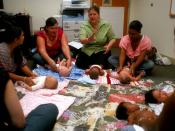Children's understanding of parentaldivorce depends on their age.
It is vital that parents know what thoughts and feelings their children may be having so that they can correct their own behavior to help the children cope with the divorce.
It is sometimes thought that infants do not really notice much changes in the home after a divorce, but it has been found that they do. They notice the parents' lack of energy and their current emotional status. Infants of an older age will notice that one parent is absent from his or her environment. They also may notice the change in feeding and napping routines because of the new situation. Because of these changes, the child may become more irritable; and the moving in of new adults may cause the infant to become uneasy and fretful. If the parent works hard to show the infant extra affection and try introducing the child to more adults, the divorce can be made easier for the child.
A toddler will definitely recognize the absence of a parent, and may show sympathy towards the sad parent. The separation may be hard for the child because he does not understand why one parent will be leaving. He expresses anger toward the parents and other relatives. He becomes worried and some may have nightmares. To help the toddler get through the separation with less stress, the parent should spend more time with him or her and reassure with words and actions their love.
Other than the fact that a parent does not live at home, an elementary child will comprehend that the parents will no longer be married and that they do not love each other any more. The children may feel that they are the cause of the problem. They worry about their daily lives being changed and who will take care of them. They may have a problem with fantasies that their parents will some how get back together. By frequently telling them that they are not to blame because of the divorce and that their needs will be met, may keep the child from being worried. Planning for the child to spend time with the other parent, being supportive of their relationship, and reminding them that the divorce is final are some things that parents can do for a child during divorce.
Preteens and adolescents understand what a divorce means but may have difficulty accepting the reality of the changes it will bring to their family. Despite the fact that they think more complexly they still may blame themselves for the divorce. They sometimes feel anger towards the parents. They may also feel abandoned by the parent that is not living in the home, act out in an aggressive behavior, and become rebellious. Children of these ages may feel that they need to worry about adult things such as finances. Parents wishing to help their preteens and adolescents should keep them very informed on the situations and decisions made and try to talk about the feeling of everyone involved without putting down each other.





